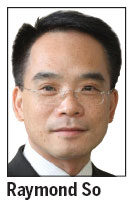Tax reform for solving budget variances
Updated: 2013-02-21 06:22
By Raymond So(HK Edition)
|
|||||||
Next Wednesday is the date for Hong Kong's annual budget speech. Financial Secretary John C Tsang has been in office since the last HKSAR government and the forthcoming budget speech will be his sixth. One often cited critique of the budget speech is the consistent, enormous gap between forecasted and actual budgetary figures. Take the budget last year as an example. The Financial Secretary forecasted that there would be a deficit of HK$3.8 billion. However, there appears to be a handsome surplus for the past year - more than HK$40 billion for the first nine months of the budget period. Some analysts even expect the annual budget surplus could reach HK$60 billion or HK$70 billion.
When compared with the original forecasted HK$3.8 billion deficit, the variance is huge. If the discrepancy is just occasional, then there is little cause for alarm. However, the annual difference between budgeted government revenue and spending is consistently vast. A large surplus has become the norm no matter how much surplus or deficit the government publicly predicts. Needless to say, the budget variances hurt the credibility of the government.
From a technical standpoint, the budget is prepared according to the projected income and expenditure of the government. Hence, the budget is actually divided into two parts, income and expenditure. In preparing the budget, it is a common practice to allocate resources to various departments according to the level of services the departments provide. Since Hong Kong is already a developed society, many government services are indeed well-planned and institutionalized. That means, these government expenditures become essential ones and will not change much from year to year. For the new expenditure items, they are already covered in the Chief Executive's Policy Address. Hence, for the expenditure side, it is relatively easy to accurately forecast spending on the known factors. The real challenge is on the side of income.

There are several major sources of income for the government. Salary tax, profit tax, stamp duty, land sale and investment returns are the most important incomes for the government. However, these income sources are volatile in nature. Since Hong Kong is an open economy, Hong Kong's economic activities will be greatly affected by global events. For a good year the government will have huge increase in tax and investment income. The downside of this income pattern is that there is not much forecast accuracy because economic conditions just change rapidly.
A simple example will illustrate this point. Take the case of Hong Kong's exports as an example. Last year the Trade Development Council (TDC) forecasted that there would be an immaterial increase of Hong Kong's exports. Several months later the TDC revised the forecasted change in export to negative figures. Then Apple introduced its newest iPhone and all of a sudden Hong Kong's export figures increased on iPhone purchases. Hong Kong's export figures clearly are unpredictable and no one had even anticipated the impacts of a new iPhone. The trade figures suggest that Hong Kong cannot escape from the fluctuations of the open economy. Back to the discussion of the budget, given the high uncertainty in economic activities, it is not surprising to have inaccurate budgeted income for the government. From the government's point of view, it is always better to underestimate the income, rather than overestimate it to manage expectations. If the government were to predict a large surplus, there would be a great outcry from the public asking for more government spending. A smaller budget amount helps to lower people's expectation.
With these considerations in mind, persistent budget variances year after year are not surprising. To compensate the public for the "unexpected" budget surplus, without incurring overspending by government, the government has typically distributed the surplus to residents on a one-off basis. The so called "sweeteners" then become the major attraction of the budget speech. People anticipate the "sweeteners" rather than examine what the budget really plans to achieve. Worse still, given the fact that the government has distributed so many sweeteners in the past few years, somehow people begin expecting more handouts. A vicious cycle then develops. Clearly something is not correct with this system.
To solve the problem, a fundamental change in the current tax system is needed. Nevertheless, it is easier said than done. There were several attempts to make changes to the tax system in previous administrations but none was successful. When so many vested interests are tied together, it is not possible to introduce change in good economic years. The old problem will continue until the bad years come.
The author is dean of the School of Business at Hang Seng Management College.
(HK Edition 02/21/2013 page1)